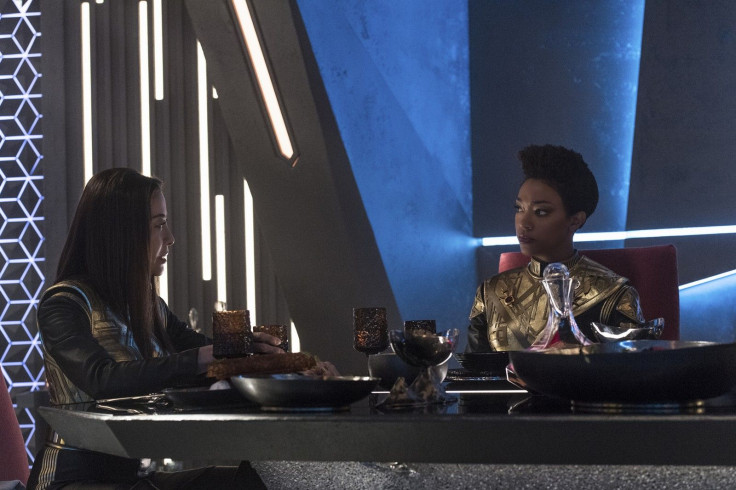In the latest episode of Star Trek: Discovery, “Vaulting Ambition,” Michael Burnham (Sonequa Martin-Green) sits down for dinner with the Emperor of the Mirror Universe. “The food is delicious, as always,” Burnham says. It’s half a lie: she’s eating with gusto (three spoonfuls in a few seconds!), but has never tasted food prepared by the imperial chef, since she’s not from the Mirror Universe. So she’s shocked to discover, mid-meal, that she’s eating Kelpien, the intelligent, Federation-member species (she was not, Discovery writers clarified, eating Mirror Universe Saru). Among the many horrors Discovery puts Burnham through in the Mirror Universe, this is one of the creepiest.

While other Mirror Universe torments transgress commonly agreed-upon, if often violated, beliefs, like prohibitions against torture or execution without trial, this whole “eating aliens” thing seems almost inevitable. If humans became an extra-planetary imperial power, we’d be eating alien burgers by the end of the week.
First, we just don’t have consistent, easily understood criteria for when we should and shouldn’t kill and eat a living thing. The act of eating meat — primal, sense-satisfying — isn’t a biological necessity, but is the default assumption for many. As beings who consistently struggle to know our own minds, a similar inquiry into animals becomes unfathomable enough to safely ignore, especially if we consider those animals food. That vacuum is safely filled up with mind-closing banalities like “If God didn’t want us to eat animals, then why are they made of meat?” the goal of which is not inquiry, but closure on the issue.
Even people with evident concern for animals butt up against incoherence all the time. Does eating this animal cause another living being to suffer? To this is often added a corollary assumption: smarter animals suffer more. Eating smart guys like octopuses and pigs is worse than eating those scaled and feathered dumbasses. But what if that Kelpien or alien gray steak I’m eating was slaughtered humanely and raised free range?
Eating Kelpien in Star Trek: Discovery isn’t so much an entry into discussing veganism or animal cruelty (read this thing about the FBI and pigs though). That’s what Okja is for. And just like Okja, or real life, our likely reaction to an extraterrestrial food source would be to nullify any ethical considerations through the distancing effects of industrialization, multiplied by light years. The consumer on Earth would probably never know they’re eating hot dogs made from grinding up aliens capable of serving alongside them aboard a starship.
And this might not be a theoretical discussion. If it is the case that extraterrestrial entities have died or been captured on Earth, then a human has eaten their flesh. How could we help ourselves? What did the archaeologist do when they found a wooly mammoth frozen in a glacier? They ate it (with a side of python patties).
If conspiracists and pseudohistorians are to be believed, there have been many opportunities. Alien conspiracy uber-site Biblioteca Pleyades lists dozens of historical contact points with aliens. For Milton William Cooper and his adherents, the Roswell crash was one incident amongst dozens throughout North America, many with piles of alien bodies and/or the human limbs they’d been busy harvesting (perhaps, in their hunger, they exceeded their safe flight cargo capacity). Somewhere in that hidden (and spurious) history, there is, whether recorded or unrecorded, the consumption of alien meat.
With all the ritual import of cannibalism — absorbing power, humiliating or honoring a defeated enemy — and no existing taboo, the temptation to eat aliens, even smart ones, doesn’t belong to the Mirror Universe alone.
- Richly redesigned Klingons
- Complex and explicable motives
- Great new Starfleet characters
- Incredible production design
- Generic space combat and action
- Too many flashbacks
- Eschews subtext, doesn't put enough faith in the audience



















